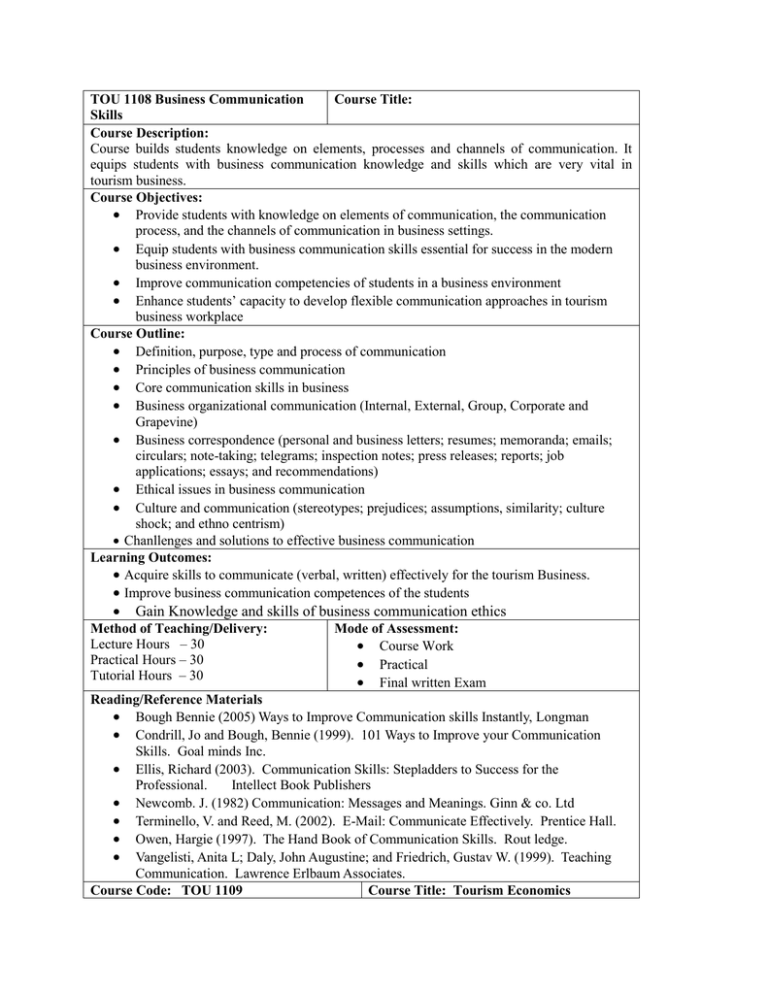
TOU 1108 Business Communication
Course Title:
Skills
Course Description:
Course builds students knowledge on elements, processes and channels of communication. It
equips students with business communication knowledge and skills which are very vital in
tourism business.
Course Objectives:
Provide students with knowledge on elements of communication, the communication
process, and the channels of communication in business settings.
Equip students with business communication skills essential for success in the modern
business environment.
Improve communication competencies of students in a business environment
Enhance students’ capacity to develop flexible communication approaches in tourism
business workplace
Course Outline:
Definition, purpose, type and process of communication
Principles of business communication
Core communication skills in business
Business organizational communication (Internal, External, Group, Corporate and
Grapevine)
Business correspondence (personal and business letters; resumes; memoranda; emails;
circulars; note-taking; telegrams; inspection notes; press releases; reports; job
applications; essays; and recommendations)
Ethical issues in business communication
Culture and communication (stereotypes; prejudices; assumptions, similarity; culture
shock; and ethno centrism)
Chanllenges and solutions to effective business communication
Learning Outcomes:
Acquire skills to communicate (verbal, written) effectively for the tourism Business.
Improve business communication competences of the students
Gain Knowledge and skills of business communication ethics
Method of Teaching/Delivery:
Lecture Hours – 30
Practical Hours – 30
Tutorial Hours – 30
Mode of Assessment:
Course Work
Practical
Final written Exam
Reading/Reference Materials
Bough Bennie (2005) Ways to Improve Communication skills Instantly, Longman
Condrill, Jo and Bough, Bennie (1999). 101 Ways to Improve your Communication
Skills. Goal minds Inc.
Ellis, Richard (2003). Communication Skills: Stepladders to Success for the
Professional.
Intellect Book Publishers
Newcomb. J. (1982) Communication: Messages and Meanings. Ginn & co. Ltd
Terminello, V. and Reed, M. (2002). E-Mail: Communicate Effectively. Prentice Hall.
Owen, Hargie (1997). The Hand Book of Communication Skills. Rout ledge.
Vangelisti, Anita L; Daly, John Augustine; and Friedrich, Gustav W. (1999). Teaching
Communication. Lawrence Erlbaum Associates.
Course Code: TOU 1109
Course Title: Tourism Economics
Course Description:
Explains major concepts in economics and relates various economic principles to tourism. Course
also highlights how the micro and macroeconomic changes influence tourism development
Course Objectives:
Explain major concepts in economics
Acquire knowledge of production in a modern economy
Apply different market concepts to tourism development
Analyse influence of micro and macroeconomic changes on tourism
Course Outline:
Concepts of economics - demand and supply, theory of price and distribution.
Circular flow of income and its measurement
Supply and demand economics – influence on tourism
Factor markets and income distribution, production function and cost function
Market structures (monopoly, perfect competition, oligopoly, monopolistic competition)
Consumer theory, revenue and profit maximization
Tourism consumer behaviour
Micro-economic indicators and social-well being - impact on tourism and recreation
International aspects of macro-economic theory (targets and instruments of
macroeconomic policy).
Cost analysis of the tourism industry
Tourism investment, financing and amenity values
Economic models – Classical, Keynesian
Economic growth and development - role of tourism
National and international business laws governing tourism; duty, customs; import and
export laws, immigration laws
Learning Outcomes:
Appreciate the importance of tourism in economic development of nations.
Acquire knowledge on the trends of tourism supply demanded
Gain knowledge on the economic models for tourism development
Method of Teaching/Delivery:
Lecture Hours – 45
Practical Hours – 15
Tutorial Hours – 15
Mode of Assessment:
Course Work
Practical
Final written Exam
Reading/Reference Materials
Begg, D. Fischer S. and Dornbersch R. (2003) Economics, McGraw Hill
GriffithsA.and Wall, J.(2000) Applied Economics, Longman
Pindyck, Robert S., and Daniel L. Rubinfeld (2004). Microeconomics. 6th ed. Upper
Saddle River, NJ: Pearson Prentice Hall.
Mankiw, N.G. Principles of Economics (International Student Edition), Fourth Edition
Sloman J. (1991), Economics, University Press, Cambridge




